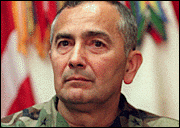Advertisement - Click to support our sponsors.


![]()
Other Views
THE Army made a decision not long ago to review the idea of resuming modified training at the Pilila'au Range at Makua. Since that time, we've been hard at work reviewing the community's concerns and seeking to address them. Progress report on
Army at MakuaWe received very helpful and constructive comments since releasing the draft of our Supplemental Environmental Assessment last September. Some of these comments were voiced at a meeting in Waianae on Jan. 27; others came to us in written form.
We had a public presentation at Makua on Jan. 20 to demonstrate to the public how we conduct combined arms live-fire training, and the control measures used to protect the environment in doing so.
In past months we have met informally with numerous leaders of the community, seeking their input in finding solutions to the issues we face. At every step of the way in this process, we've sought the public's involvement.
In the course of that dialogue, we identified 14 issues most often cited as areas of concern. I directed my staff to thoroughly examine each of these and develop proposed ways to respond as well.
As I see it, our task is to do everything we can to respond to these concerns where possible. We will work to find a middle ground with the majority on our proposals.
For example, some expressed worry about transporting ammunition along Farrington Highway. The safety record here is impeccable; there has never been an accident in Hawaii involving the movement of ammunition to a military training area. But we will work to address the community's concern by scheduling the movement of ammunition during off-peak traffic hours to minimize this issue.
Many people expressed a desire to have more access to Makua for cultural observances. Our proposal is to provide opportunities for Hawaiian cultural practitioners to do just that -- with some prior notice -- to allow access to the cultural sites for specific observances, consistent with safety.
Some have asked that the Army do more to educate soldiers about the cultural significance of Makua. We are developing an educational program for new soldiers and leaders arriving in Hawaii, to orient them to the history and culture of Hawaii, especially that of Makua.
Some residents voiced concern about groundwater. In 1992 we halted operations at the Open Burn/Open Detonation site, which was operating in full compliance with Environmental Protection Agency guidelines for the disposal of wastes. The soil and water in this site were tested, and results show no health risk to the public. But we're looking at installing additional wells to take samples as part of a long-term groundwater monitoring program; we'll provide those results to the public.
Because fire may be the most serious potential threat to the valley, we have instituted a robust wildland fire management plan that includes both fire prevention and fire suppression measures. This program will have an initial start-up cost of $1.2 million, then cost about $600,000 annually to maintain.
The funds provide for firebreak maintenance, firefighter training, fire equipment and a modern weather and fire prediction system. It provides for increased aerial and ground firefighting capability, using fresh water instead of salt water that could harm plant species.
Our plan for modified training reduces the danger of fire by restricting the use of tracers, illumination rounds, helicopter-fired rockets and missiles. This action alone will reduce by 60 percent the probability of ignitions caused by ammunition.
DURING the past two years, we've sought extensive consultation with outside agencies, including the U.S. Fish and Wildlife Service, the State Historical Preservation Office and the Environmental Protection Agency.
We're currently in the process of meeting with various private-sector leaders and organizations to discuss our proposals in an effort to continue our dialog with the community. We will not make a final decision on training at Makua until all of these 14 concerns have been carefully considered, addressed and, where possible, remedied.
Major Gen. James M. Dubik is commanding general,
25th Infantry Division (Light) and U.S. Army, Hawaii.